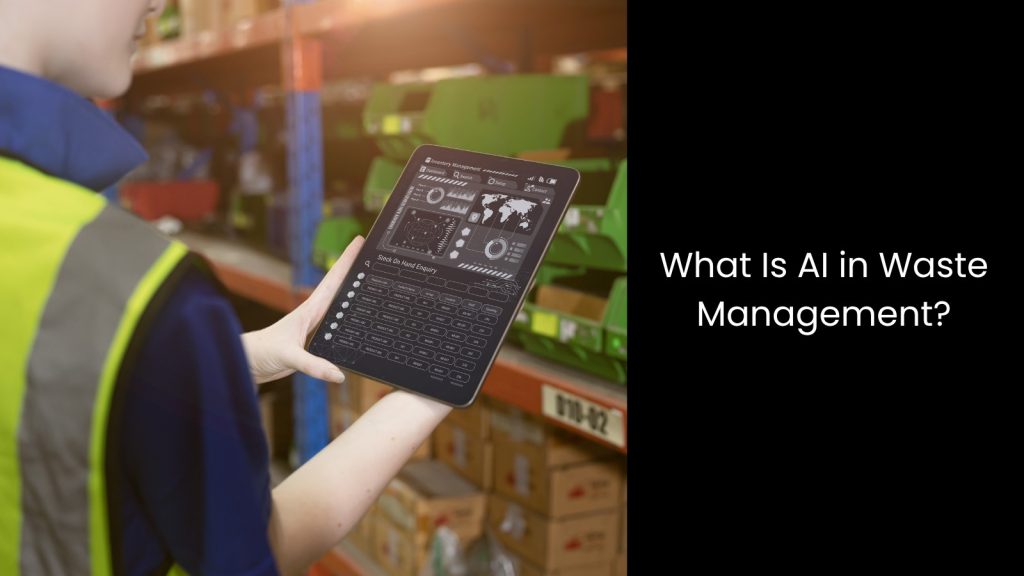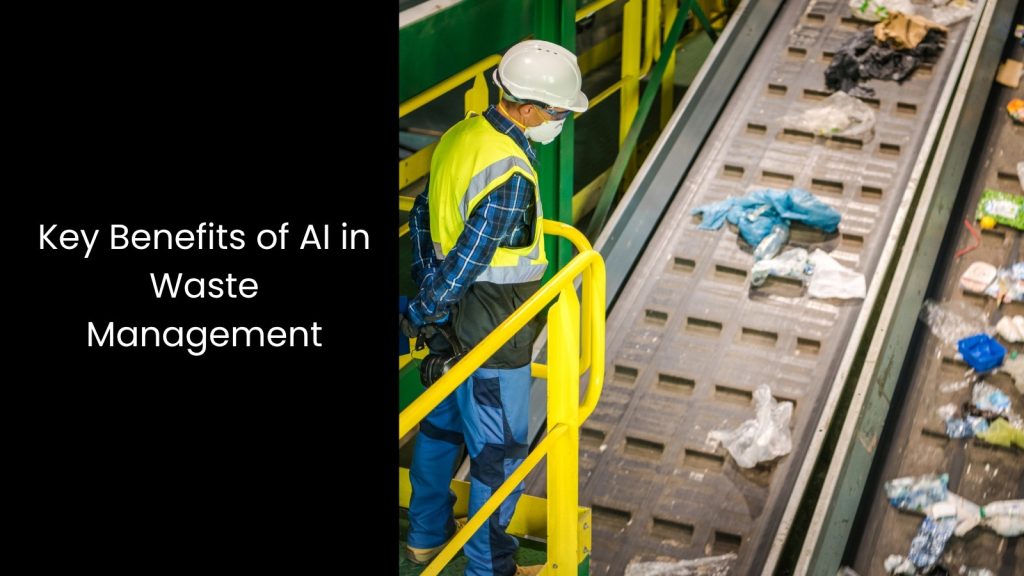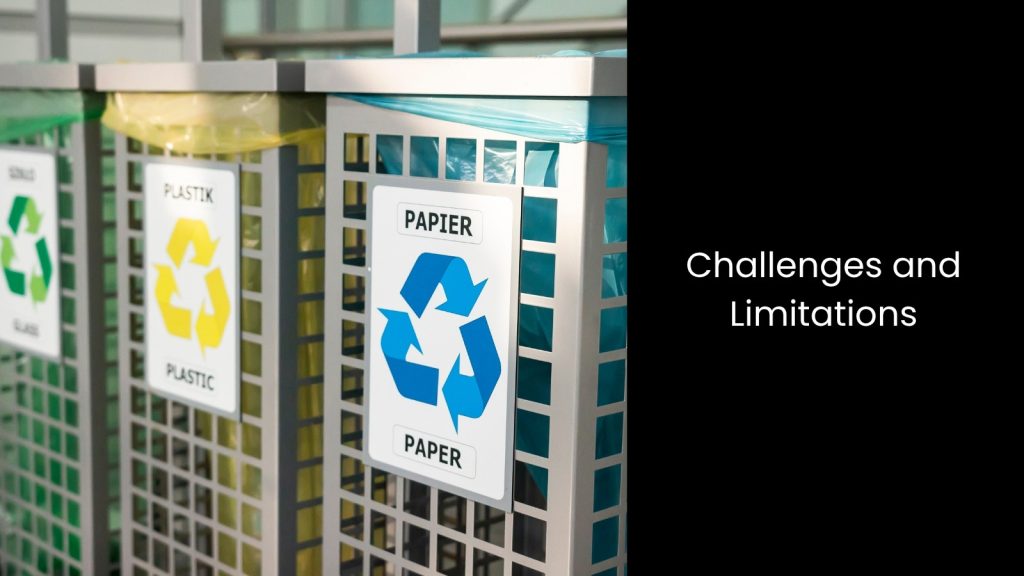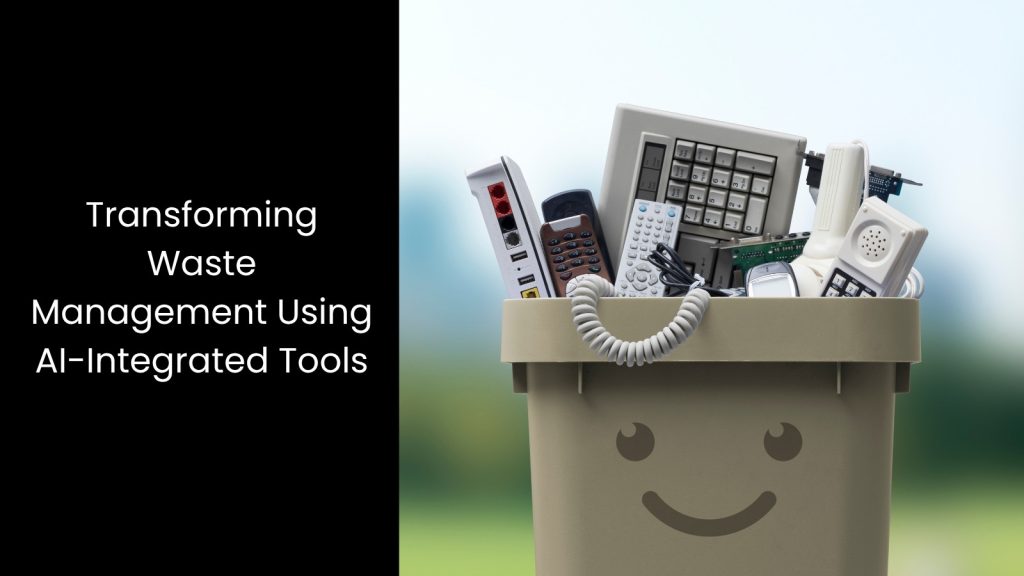The world produces so much garbage that experts predict it will reach 3.4 billion tonnes by 2050. As waste piles up, traditional systems fail to keep pace. That gap calls for smarter ideas, and AI in waste management might just be the breakthrough we need. From automated sorting robots to real-time tracking tools, smart waste management solutions are stepping up fast.
In this article, you will discover how artificial intelligence brings new levels of efficiency, helps cut costs, and supports cleaner, more sustainable practices.
We will look into
What Is AI in Waste Management?

- This means using smart computer systems that can think and learn like humans to make waste handling smarter and faster. How exactly does this occur?
- Machine learning, which is a part of AI, allows these systems to get better over time as they gather more data. Instead of sorting through heaps of trash manually, workers can now rely on machines that know how to tell plastic from paper or food waste just by looking at it.
- These systems work in waste collection trucks, sorting stations, and recycling plants. For example, AI waste sorting machines use cameras and sensors to recognise different materials, then robotic arms pick and place them into the right bins.
- In many cities, people use smart waste bins that can detect when they are full and send alerts for collection, cutting down on overflowing bins. There are also AI-powered robots that move quickly and sort rubbish way more accurately than humans. This kind of artificial intelligence in recycling makes the process quicker, saves money, and reduces human mistakes.
- With AI stepping in, waste management becomes cleaner and more organised. It helps people deal with trash in a smarter, more modern way that actually makes a difference.
Key Benefits of AI in Waste Management

Improved Sorting Accuracy
When waste piles up, sorting it correctly becomes a huge challenge, especially with so many materials mixed together. That is where AI steps in and changes the game completely.
Using smart cameras and sensors, waste management technology powered by AI quickly recognises whether an item is plastic, glass, paper, or even food. These machines do not just guess; instead, they actually learn and improve as they go. They sort much faster and way more accurately than humans ever could. This means recyclables end up in the right bins, and nothing useful goes to landfills.
In places where people used to spend hours picking through trash, AI-powered systems now do that job in minutes with hardly any mistakes. Also, because these systems work all day without getting tired, the sorting process runs smoothly and nonstop. That makes a huge difference when cities deal with tonnes of waste every day.
People have already seen real improvements where these machines have been used. The benefits of AI in waste management start to show right away, from cleaner recyclables to less waste contamination. As a result, recycling centres get better results, and the whole process becomes way more effective.
So, when we talk about AI waste sorting, we are not just talking about robots doing cool stuff. We are talking about a solid solution that helps us clean up smarter.
Reduced Operational Costs
Running a waste management system costs a lot of money, especially when things go wrong. Trucks might take longer routes, workers spend time fixing sorting mistakes, or machines break down without warning. But when AI steps into the picture, things change in a big way.
It helps teams plan smarter, respond quicker, and waste fewer resources. For example, smart AI tools can track the best routes for garbage trucks, so they do not waste time or fuel. That alone saves a good amount of money every week. Plus, AI sorting machines need fewer people to run them, which lowers labour costs while still doing the job well.
One of the biggest benefits of this is how it cuts down on extra work and unnecessary spending. AI also checks equipment performance and gives alerts before something breaks, which stops big repairs from catching teams off guard. That kind of thinking saves time and money. This kind of waste management technology works quietly in the background but makes a loud impact on budgets.
Over time, businesses and city services spend less on repairs, fuel, and sorting mistakes, and they get more done with the same tools.
Real-Time Monitoring and Predictive Analytics
In the fast-moving world of waste collection, knowing what is occurring right now makes a huge difference. With AI, waste managers no longer have to guess or wait for problems to show up; they see issues as they happen and even before they happen.
That is due to real-time monitoring and predictive tools. These AI systems use smart sensors and software to track how full bins are, how fast waste is being sorted, or whether machines are acting strangely. This kind of waste management technology gives teams instant updates, which means they can fix issues fast and avoid bigger messes.
It does not stop there, though. AI systems do not just look at what is happening now; they also study old data to spot patterns. That is what predictive analytics is all about. It helps planners see when bins usually overflow or when machines tend to slow down, so they can plan better routes and maintenance schedules. This leads to smoother operations and fewer surprises.
When people use AI in waste systems, they work with more confidence and less guesswork. That is one of the strongest benefits of AI in waste management; it brings information to the front and helps teams act before small problems grow big. Everything stays cleaner, more organised, and less stressful.
Environmental Impact Reduction
AI helps the planet breathe easier. When waste sorting becomes more accurate and when trucks drive smarter routes, the entire process produces less pollution. That is where AI shines, as it supports better decisions that lead to less waste going to landfills and fewer greenhouse gases released into the air.
For example, when AI sorts trash correctly, recyclables do not get mixed with garbage, which means more materials get reused instead of being burned or buried. That makes a big environmental difference. Also, when trucks use AI tools to plan faster routes, they spend less time on the road, which means they burn less fuel. That helps reduce the carbon footprint of every collection run.
Plus, real-time data helps workers act fast when there is a problem, like a bin leaking or waste spilling. Fast action keeps local environments cleaner and safer. All these little wins add up over time.
So, the benefits of AI in waste management stretch beyond cost savings. They reach into how we take care of the Earth. Smart waste management technology helps cut down on pollution, improve recycling success, and even slow down the damage caused by poor waste habits. People today care more about doing things in a cleaner, smarter way, and AI helps them follow through.
It is not just about high-tech systems; it is about helping communities make less of a mess and take more responsibility. Every time AI helps reduce waste or save energy, the planet gets better and better.
Challenges and Limitations

High Initial Investment
- Setting up AI in waste systems costs a lot at first. This is why companies must buy smart machines, install sensors, and train staff. Many feel unsure about spending that much money upfront, especially when results do not show right away. It feels risky, so some hold back even if the long-term payoff seems worth it.
Integration with Legacy Systems
- It is an issue that many waste companies still use old machines and outdated tools. When they try to mix AI with these old systems, things often do not work smoothly. The parts do not talk well to each other, and fixing this mess costs time and effort. That makes people nervous about switching to smarter tools.
Data Privacy Concerns
- AI systems collect lots of data, like tracking bin usage and location patterns. If someone hacks that data or misuses it, people could lose trust. Teams must protect this information properly, but that is not always easy. When privacy feels shaky, people start to question how safe this technology is.
Need for Skilled Workforce
- We all know that AI does not run itself; it needs smart people to set it up, monitor it, and fix issues. However, you cannot build a trained worker overnight. Many companies struggle to find people who know how these systems work. Without enough skilled hands, the tech ends up sitting idle or running poorly.
Transforming Waste Management Using AI-Integrated Tools

Turning waste into smarter opportunities starts with the right tools. AI-powered waste management systems do not just automate; they transform. They help you reduce mess, track everything in real time, and make decisions that matter. If your goal is to stay ahead in a changing world, an AI-integrated solution developed by an industry expert will give you the edge your operations need.

